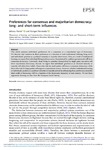Mostrar o rexistro simple do ítem
Preferences for Consensus and Majoritarian Democracy: Long- and Short-Term Influences
| dc.contributor.author | Ferrín, Mónica | |
| dc.contributor.author | Hernández, Enrique | |
| dc.date.accessioned | 2021-05-06T13:31:30Z | |
| dc.date.available | 2021-05-06T13:31:30Z | |
| dc.date.issued | 2021 | |
| dc.identifier.citation | Ferrín, M., & Hernández, E. (2021). Preferences for consensus and majoritarian democracy: Long- and short-term influences. European Political Science Review, 13(2), 209-225. doi:10.1017/S1755773921000047 | es_ES |
| dc.identifier.issn | 1755-7747 | |
| dc.identifier.uri | http://hdl.handle.net/2183/27899 | |
| dc.description | Financiado para publicación en acceso aberto: Universidade da Coruña/CISUG | |
| dc.description.abstract | [Abstract] This article analyzes individuals’ preferences for a consensus or a majoritarian type of democracy. We theorize that variation in these preferences is a function of both institutional learning (long term) and individuals’ position as a political minority or majority (short term). First, as a result of institutional learning, we expect that individuals living in democracies characterized by coalition governments will favor consensus democracy. Conversely, those living in countries characterized by single-party executives will favor majoritarian democracy. Second, we expect that individuals’ position as an electoral minority or majority will affect these beliefs. Those who vote for small parties will favor a consensus democracy, while those who vote for large parties will support a majoritarian system. However, whether institutional learning or individuals’ position as a political minority or majority prevail in influencing these preferences about the ideal model of democracy will be a function of the democratic trajectory of each country. We test these arguments drawing on data from the European Social Survey. | es_ES |
| dc.description.sponsorship | This research has received financial support from the Spanish Ministry of Science, Innovation, and Universities through research grant CSO2017-83086-R | |
| dc.language.iso | eng | es_ES |
| dc.publisher | Cambridge University | es_ES |
| dc.relation | info:eu-repo/grantAgreement/AEI/Plan Estatal de Investigación Científica y Técnica y de Innovación 2017-2020/CSO2017-83086-R/ES/CAMBIO POLITICO EN ESPAÑA: POPULISMO, FEMINISMO Y NUEVOS EJES DE CONFLICTO | |
| dc.relation.uri | ttps://doi.org/10.1017/S1755773921000047 | es_ES |
| dc.rights | Atribución 4.0 Internacional (CC BY 4.0) | es_ES |
| dc.rights.uri | https://creativecommons.org/licenses/by/4.0/ | * |
| dc.subject | Democracy | es_ES |
| dc.subject | Consensus | es_ES |
| dc.subject | Majoritarian | es_ES |
| dc.subject | Political Attitudes | es_ES |
| dc.subject | Survey | es_ES |
| dc.title | Preferences for Consensus and Majoritarian Democracy: Long- and Short-Term Influences | es_ES |
| dc.type | info:eu-repo/semantics/article | es_ES |
| dc.rights.access | info:eu-repo/semantics/openAccess | es_ES |
| UDC.journalTitle | European Political Science Review | es_ES |
| UDC.volume | 13 | es_ES |
| UDC.issue | 2 | es_ES |
| UDC.startPage | 209 | es_ES |
| UDC.endPage | 225 | es_ES |
| dc.identifier.doi | 10.1017/S1755773921000047 |
Ficheiros no ítem
Este ítem aparece na(s) seguinte(s) colección(s)
-
GI-ESOMI - Artigos [83]






